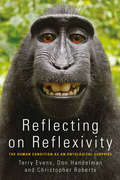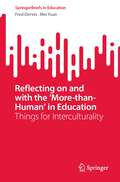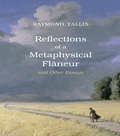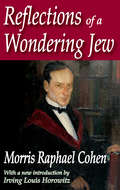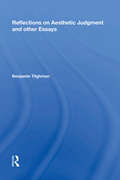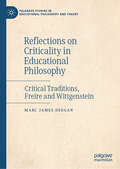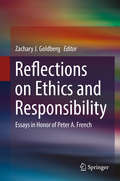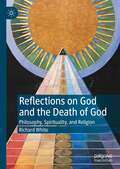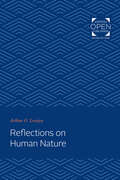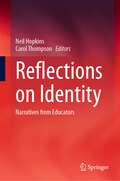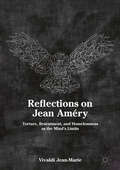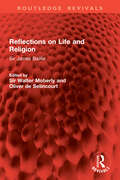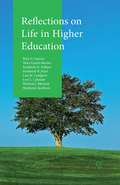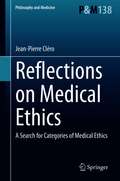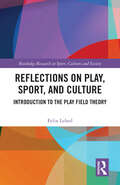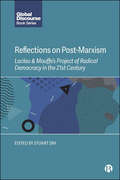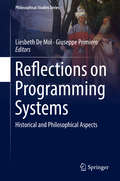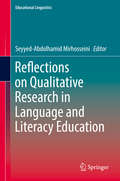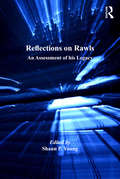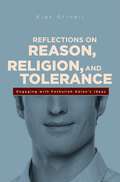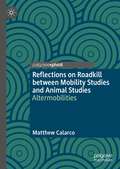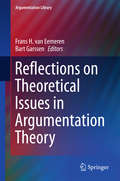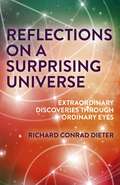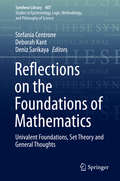- Table View
- List View
Reflecting on Reflexivity: The Human Condition as an Ontological Surprise
by T. M. S. Terry Evens Don Handelman Christopher RobertsHumanness supposes innate and profound reflexivity. This volume approaches the concept of reflexivity on two different yet related analytical planes. Whether implicitly or explicitly, both planes of thought bear critically on reflexivity in relation to the nature of selfhood and the very idea of the autonomous individual, ethics, and humanness, science as such and social science, ontological dualism and fundamental ambiguity. On the one plane, a collection of original and innovative ethnographically based essays is offered, each of which is devoted to ways in which reflexivity plays a fundamental role in human social life and the study of it; on the other-anthropo-philosophical and developed in the volume's Preface, Introduction, and Postscript-it is argued that reflexivity distinguishes-definitively, albeit relatively-the being and becoming of the human.
Reflecting on and with the ‘More-than-Human’ in Education: Things for Interculturality (SpringerBriefs in Education)
by Fred Dervin Mei YuanThis book examines today’s central and yet often misunderstood and misconstrued notion of interculturality. It specifically focuses on one aspect of intercultural awareness that has been ignored in research and education: the presence and influence of things on the way we experience, do, and reflect on interculturality. This book provides the readers with opportunities to engage with interculturality by reflecting on how our lives are full of things and entangled with them. It urges teachers, teacher educators, scholars, and students to open their eyes to the richness that the more-than-human, with which we can reflect, has to offer for intercultural communication education.
Reflections of a Metaphysical Flaneur: and Other Essays
by Raymond TallisThese essays from one of our most stimulating thinkers showcase Tallis's infectious fascination, indeed intoxication, with the infinite complexity of human lives and the human condition. In the title essay, we join Tallis on a stroll around his local park - and the intricate passages of his own consciousness - as he uses the motif of the walk, the amble, to occasion a series of meditations on the freedoms that only human beings possess. In subsequent essays, the flaneur thinks about his brain, his relationship to the rest of the animal kingdom, his profession of medicine and about the physical world and the claims of physical science to have rendered philosophical reflection obsolete. Taken together the essays continue Tallis's mission to elaborate a vision of humanity that rejects religious myths while not succumbing to scientism or any other form of naturalism. Written with the author's customary intellectual energy and vigour these essays provoke, move and challenge us to think differently about who we are and our place in the material world.
Reflections of a Wondering Jew
by Morris CohenMuch as he considered himself a philosopher, Morris Raphael Cohen was also immersed in the machinery of social life. From his first years of "engagement" as a volunteer teacher in Thomas Davidson's school for working-class people, to his last as professor of philosophy at New York's City College and at the University of Chicago, he constantly sought to understand the underlying assumptions of human behavior.The studies Cohen gathered together for Reflections of a Wondering Jew are an indication of representative achievements of his life. He was deeply involved in the experience of the American Jewish community, and much of his work here consists of an inquiry into and analysis of specifically Jewish affairs. Some of his most valuable contributions to American thought and maturity are those that were never included in standard philosophical efforts. His work and scholarship provide foundations for the field of human problems and the history of ideas. These lectures illuminated the way forward in so many of our crisis years.There is a certain tragedy to the fact that for many decades Morris Raphael Cohen had hoped to organize and put into systematic form his literary reflections on Jewish problems and American liberalism. Towards the end of his life, he faced the realization that many of his intended writings would never reach fruition. Though this volume may not be quite what Cohen intended, it is a product of a mature giant in American intellectual history.
Reflections on Aesthetic Judgment and other Essays
by Benjamin TilghmanBenjamin Tilghman has been a leading commentator on analytic philosophy for many years. This book brings together his most significant and influential work on aesthetics. Spanning a period of thirty years and covering topics in aesthetics from literature to painting, the collection traces the development of Tilghman's two principal themes; a rejection of philosophical theory as a way of resolving problems about our understanding and appreciation of art and the importance of the representation and presentation of the human and human concerns in art. Tilghman is profoundly influenced by the philosophy of Ludwig Wittgenstein and his work is informed throughout by his conception and practice of philosophy. Written with exceptional clarity and with many references to original work in both painting and literature, this collection will be an invaluable resource not only for professional philosophers but for those working in the arts generally, art historians, critics and literary theorists.
Reflections on Criticality in Educational Philosophy: Critical Traditions, Freire and Wittgenstein (Palgrave Studies in Educational Philosophy and Theory)
by Marc James DeeganThis book navigates global educational policy concerning critical thinking skills and competencies. The author explores the concept of criticality from the perspectives of several critical traditions, and draws on the works of Paulo Freire and Ludwig Wittgenstein. The diverse and intricate ideas, methods and ways of thinking that emerge are examined in the new perspectival space of ‘criticality scholarship’. Pursuing his own political and philosophical aspirations, the author endeavours to link a critical education with the promotion of democracy and social justice. Opportunities for further empirical and theoretical research are signposted. The book will be of interest to scholars in educational philosophy.
Reflections on Ethics and Responsibility
by Zachary J. GoldbergThe original essays in this book address the influential writings of Peter A. French on the nature of responsibility, ethics, and moral practices. French's contributions to a wide spectrum of philosophical discussions have made him a dominant figure in the fields of normative ethics, meta-ethics, applied ethics, as well as legal and political philosophy. Many of French's deepest insights come from identifying and exploring the scope and nature of moral responsibility and human agency as they appear in actual events, real social and cultural practices, as well as in literature and film. This immediacy renders French's scholarship vital and accessible to a wide variety of audiences. The authors, recognized for their own contributions to the understanding of the nature of morality and moral practices offer new and unique positions while exploring, expanding and responding to those of French. The final chapter is written by French, in which he provides both new philosophical insight as well as some reflection on his own work and its influence. This book will appeal to philosophers, as well as advanced students and researchers in the humanities, social sciences, law, and political science.
Reflections on God and the Death of God: Philosophy, Spirituality, and Religion
by Richard WhiteWhat is God? What does it mean to believe in God? What happens to God after the death of God? This book examines “the death of God” from a philosophical standpoint. It focuses on monotheism, polytheism, and nature, and it discusses the renewed importance of spirituality—and the “spiritual but not religious”—in response to the death of God. In recent years, religious belief has been in decline, but secularism cannot satisfy our spiritual needs. We are now living in a “post-secular” age in which the relationship between philosophy, spirituality, and religion must be re-examined. As an exploratory essay, this book engages the reader at a profound level, and considers a variety of modern thinkers, including Nietzsche, Hegel, Freud, Levinas, Assmann, and Buber. It offers a sustained meditation on the origin of God, the death of God, and the future of “God” as a guiding ideal.
Reflections on Human Nature
by Arthur O. LovejoyOriginally published in 1961. Arthur O. Lovejoy, beginning with his book The Great Chain of Being, helped usher in the discipline of the History of Ideas in America. In Reflections on Human Nature, Lovejoy devotes particular attention to influential figures such as Hobbes, Locke, Bishop Butler, and Mandeville, tracing developments and changes in the concept of human nature through the seventeenth and eighteenth centuries. He also discusses the theory of human nature held by the founders of the American Constitution, giving special attention to James Madison and the "Federalist Papers."
Reflections on Identity: Narratives from Educators
by Carol Thompson Neil HopkinsThis book seeks to extend perspectives on professional identity in education. Chapters consider the notion of expertise, the impact of managerial approaches, the importance of communities of practice, and the effects of increasingly marketised approaches.By using narratives, the book opens up a ‘conversation’ about this important topic. Educators and leaders from a variety of settings will explore their professional experiences and the impact these have had on forming values in the professional role. By drawing on personal experience, individual authors will consider some of the challenges they have encountered as part of identity formation. The significance of organisational cultures is discussed throughout the book and explores the ways in which individual autonomy is both threatened and claimed. Issues discussed include the frequent changes imposed through government initiatives and the social perception of education professionals when compared to other professional roles. Contributions have been drawn from teachers and leaders in schools, colleges, universities and specialist training. Chapter authors have a variety of experiences offering a multi-perspective approach. This will include strategic leadership, operational management and classroom practice, all of which offer insights of interest to educators at various points on the professional journey. The narrative approach adopted by authors provides the opportunity for readers to engage with others’ experiences, enabling personal reflection on their own professional identity.
Reflections on Jean Améry: Torture, Resentment, and Homelessness as the Mind’s Limits
by Vivaldi Jean-MarieThis book elaborates Jean Améry’s critique of philosophy and his discussion of some central philosophical themes in At the Mind’s Limits and his other writings. It shows how Améry elaborates the shortcomings and unfitness of philosophical theories to account for torture, the experience of homelessness, and other indignities, and their inability to assist with overcoming resentment. It thus teases out the philosophical import of Jean Améry's critique of philosophy, which constitutes his own philosophical testament of being an inmate at Auschwitz. This book situates At the Mind’s Limits in the context of twentieth-century Continental philosophy. On the one hand, it elaborates Améry’s engagement with key philosophical figures. On the other hand, it shows how thoroughly Améry denounces the limits of the philosophical enterprise, and its impotence in capturing and accounting for the crimes of the Third Reich.
Reflections on Life
by Alexis CarrelIn this present volume, the author of Man the Unknown makes clear why civilisation is on the edge of an abyss and propounds three basic laws of nature in which, he believes, lies mankind’s only salvation: Effects of Chemical Factors, Effects of Physical Factors, and Effects of Physiological Habits.
Reflections on Life and Religion: Sir James Baillie (Routledge Revivals)
by Sir Walter Moberly Oliver De SelincourtFirst published in 1952, Reflections on Life and Religion is a collection of selected entries made by Sir James Baillie from 1893 to his death. These entries, preserved as MS. Volumes labeled “Privatissima”, are a record of the inner mind of a thinker of wide culture who enjoyed extensive contacts with public affairs as well as with worlds of philosophy and education.The book is divided into three main sections dealing with religion; ethical and social philosophy; and metaphysics and theory of knowledge. Each of these sections is further divided into several shorter subsections, in accordance with the requirements of the subject area. The appendix contains a number of short entries which could not find a suitable place in the main body of the text.This volume will be a fascinating read for anyone interested in religion, philosophy, and particularly metaphysics.
Reflections on Life in Higher Education
by Ward Rick D. Saucier Nora Ganim Barnes Kimberly K. Folkers Frederick B. Hoyt Lisa M. Lindgren Lori L. Lohman Michael J. Messina Stephanie Jacobsen FarrisThis book explores the challenges of an academic teaching career. The authors discuss the issues that may arise in the tenure process, scholarship activities, publishing, and providing service to their academic communities as well as how to keep teaching lessons relevant and fresh.
Reflections on Medical Ethics: A Search for Categories of Medical Ethics (Philosophy and Medicine #138)
by Jean-Pierre CléroThis book questions the notions of person, personality, dignity, and other connected notions such as (informed) consent, and discusses new perspectives on categories that allow ethical debates in medicine to overcome morals and ordinary religious schemes. The book states that one has to be careful when thinking about situations in terms of notions and principles that have been obtained in similar situations. Though this book is mostly philosophical, it is also of great practical interest to healthcare givers. It warns caregivers not to rely too much on notions such as person, autonomy, and consent, which are supposedly firm but can be proven to be unreliable in spite of appearances. Furthermore, this work warns against a narrow anthropologisation of ethics which would make technophobian positions unavoidable. On the contrary, this book is open to robotics and offers – among other things - a sustained exploration of the notion of intimacy.
Reflections on Play, Sport, and Culture: Introduction to the Play Field Theory (Routledge Research in Sport, Culture and Society #141)
by Felix LebedThe psychological dependence of humanity on playing is huge. Its nature and functional utility are unclear. These linked yet contradictory issues have created the intrigue that has fed philosophical thought for more than two hundred years. During this period, philosophy transferred many of the subjects of its analysis to the aegis of the humanities that it spawned. Each of them pays close attention to human play and studies it with its own methods of theoretical and experimental research. Thus, what was once a general philosophical comprehension of human play has branched out into different directions, definitions, and theories. This new book represents a renewed general view of human play. The unique quality of the volume lies in its fairly rare interdisciplinary methodology, encompassing a broad spectrum of the humanities: philosophy, anthropology, sociology, and the history of play, and behavioral analysis of playing, which have been done by the author. As a result, the volume ends with the proposition of a new general approach to human play that is named by the author “play field theory”. Such an approach makes reflections on play, sport, and culture a source for all scholars studying play, by widening their knowledge through both a new general view and their familiarization with notions from neighboring fields and disciplines.
Reflections on Post-Marxism: Laclau and Mouffe's Project of Radical Democracy in the 21st Century (Global Discourse)
by Stuart SimThe world has changed dramatically since the emergence of post-Marxism, and a reassessment is needed to determine its significance in the modern world. First published as a special issue of Global Discourse, this book explores the theoretical position of post-Marxism and investigates its significance in recent global political developments such as Brexit, Trump and the rise of the far right. With valuable insights from international contributors across a range of disciplines, the book puts forward a strong case for the continuing relevance of post-Marxism and, particularly, for Ernesto Laclau and Chantal Mouffe’s theory of radical democracy.
Reflections on Programming Systems: Historical And Philosophical Aspects (Philosophical Studies Series #133)
by Giuseppe Primiero Liesbeth De MolThis book presents a historical and philosophical analysis of programming systems, intended as large computational systems like, for instance, operating systems, programmed to control processes. The introduction to the volume emphasizes the contemporary need of providing a foundational analysis of such systems, rooted in a broader historical and philosophical discussion. <P><P> The different chapters are grouped around three major themes. The first concerns the early history of large systems developed against the background of issues related to the growing semantic gap between hardware and code. The second revisits the fundamental issue of complexity of large systems, dealt with by the use of formal methods and the development of `grand designs’ like Unix. Finally, a third part considers several issues related to programming systems in the real world, including chapters on aesthetical, ethical and political issues. <P><P> This book will interest researchers from a diversity of backgrounds. It will appeal to historians, philosophers, as well as logicians and computer scientists who want to engage with topics relevant to the history and philosophy of programming and more specifically the role of programming systems in the foundations of computing.
Reflections on Qualitative Research in Language and Literacy Education
by Seyyed-Abdolhamid MirhosseiniThis book discusses aspects of the theory and practice of qualitative research in the specific context of language and literacy education. It addresses epistemological perspectives, methodological problems, and practical considerations related to research involvements in areas of language education and literacy studies rather than generic issues of other fields of social sciences. The volume starts with Theoretical Considerations in the first part and raises some epistemological and theoretical concerns that are rarely debated in the specific context of research on language and literacy teaching. The second part, Methodological Approaches explores issues of the design and implementation of language and literacy education research within the framework of some of the major established qualitative research traditions. Finally, the part on Research in Action discusses practical aspects of a few actual instances of qualitative research on language and literacy education in different contexts.
Reflections on Rawls: An Assessment of his Legacy
by Shaun P. YoungThe late John Rawls was one of the most inspiring, provocative and influential political philosophers of the twentieth century. In this collection a panel of distinguished political philosophers critically explore the intellectual legacy of Rawls. The essays herein engage Rawls's political theorizing from his earliest published writings in the 1950s to his final publication in 2001, Justice as Fairness: A Restatement and explore a diversity of issues related to his arguments, such as the attractiveness of his methodology/methodologies, and the normative coherence and empirical validity of his claims. In turn, the effectiveness both of his arguments and those of various supporters and critics are evaluated from the perspective of a variety of analytical approaches, including cosmopolitanism, communitarianism, perfectionism, liberalism, and legal theory. This book is an edifying and engaging dialogue with ideas and arguments that have provided the theoretical framework for much of contemporary political philosophy, and a thoughtful assessment of their continuing significance and place within the pantheon of political philosophy.
Reflections on Reason, Religion, and Tolerance: Engaging with Fethullah Gulen's Ideas
by Klass GrinellThis is an attempt to reflect on Islam as it appears in the context of Fethullah Gulen's teachings, an influential Turkish-Muslim scholar who inspired a movement of education and interfaith dialogue. Grinell's extensive study of Islam and of Gulen allows him to pinpoint a unique expression of values and beliefs that could alter the typical understanding of Islam and Muslims in the West. He draws upon his previous studies of the Gulen Movement and comparatively places Gulen in a wider context of faith and society. What is the concept of knowledge in Islam as understood by Gulen? How is faith and service to people connected? Is Gulen after building a sultanate? Does the Gulen movement have a (hidden) political agenda? How traditional or modern is Gulen? These are some of the questions Grinell attempts to answer from his perspective. As a humanistic researcher on Islam, Grinell believes we definitely have something to learn from Islam.
Reflections on Roadkill between Mobility Studies and Animal Studies: Altermobilities
by Matthew CalarcoRoadkill is a recurrent but often unthought feature of modern life. Yet, consideration of the broader significance of the myriad social, ethical, and political issues related to roadkill has largely gone missing from mainstream scholarship and activism. This neglect persists even in fields such as mobility studies and animal studies that would otherwise seem to have a vested interest in the topic. This book aims to bring roadkill to the foreground of current discussions among scholars and activists in these fields in order to demonstrate that roadkill is a uniquely important site from which to understand and contest the machinations of the dominant social order. It argues that a careful examination of roadkill can help both to uncover the hidden violence of contemporary human-centered systems of mobility and to develop alternative modes of mobility for a renewed social life in common with our more-than-human kin.
Reflections on Theoretical Issues in Argumentation Theory
by Frans H. van Eemeren Bart GarssenThis volume presents a selection of papers reflecting key theoretical issues in argumentation theory. Its six sections are devoted to specific themes, including the analysis and evaluation of argumentation, argument schemes and the contextual embedding of argumentation. The section on general perspectives on argumentation discusses the trends of empiricalization, contextualization and formalization, offers descriptions of the analytical and evaluative tools of informal logic, and highlights selected principles that argumentation theorists do and do not agree upon. In turn, the section on linguistic approaches to argumentation focuses on the problem of distinguishing between explanation and argument, while also elaborating on the role of verbal indicators of argument schemes. All essays included in this volume point out notable recent developments in the study of argumentation.
Reflections on a Surprising Universe: Extraordinary Discoveries Through Ordinary Eyes
by Richard Conrad DieterReflections on a Surprising Universe takes the reader beyond the headlines of the latest scientific breakthroughs, translating complicated topics into an understandable narrative. It covers a wide array of scientific developments in clear and concise language sharing a sense of wonder felt by the author about the universe we find ourselves in. The book covers such developments as the size and expansion of the universe, black holes, gravitational waves, the relativity of spacetime, the multiverse, exoplanets and the possibility of extraterrestrial life, DNA, fundamental particles, quantum mechanics and quantum computers, all in an accessible narrative. Do you feel a sense of excitement and awe in learning about both the vastness and intricacies of the world around you? Then let Richard Dieter guide you through the unique synthesis of recent scientific discoveries and what they reveal about us.
Reflections on the Foundations of Mathematics: Univalent Foundations, Set Theory and General Thoughts (Synthese Library #407)
by Stefania Centrone Deborah Kant Deniz SarikayaThis edited work presents contemporary mathematical practice in the foundational mathematical theories, in particular set theory and the univalent foundations. It shares the work of significant scholars across the disciplines of mathematics, philosophy and computer science. Readers will discover systematic thought on criteria for a suitable foundation in mathematics and philosophical reflections around the mathematical perspectives.The volume is divided into three sections, the first two of which focus on the two most prominent candidate theories for a foundation of mathematics. Readers may trace current research in set theory, which has widely been assumed to serve as a framework for foundational issues, as well as new material elaborating on the univalent foundations, considering an approach based on homotopy type theory (HoTT). The third section then builds on this and is centred on philosophical questions connected to the foundations of mathematics. Here, the authors contribute to discussions on foundational criteria with more general thoughts on the foundations of mathematics which are not connected to particular theories.This book shares the work of some of the most important scholars in the fields of set theory (S. Friedman), non-classical logic (G. Priest) and the philosophy of mathematics (P. Maddy). The reader will become aware of the advantages of each theory and objections to it as a foundation, following the latest and best work across the disciplines and it is therefore a valuable read for anyone working on the foundations of mathematics or in the philosophy of mathematics.
